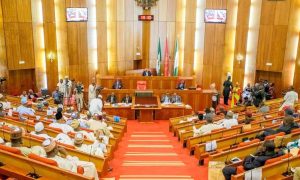At the end of February, the Nigerian government handed tycoon Paul Onwuanibe a notice to vacate eight hectares of beachfront land in Lagos that his Landmark group had developed since 2006. Landmark Beach, as the area was known, was to make way for a 700-kilometre (435-mile) coastal highway designed to connect Lagos to Calabar, in eastern Nigeria.
“It was devastating,” Mr Onwuanibe tells fDi Intelligence.
“For a three-day period in April, they demolished what was known as Landmark Beach, effectively destroying more than N40bn ($24.9m) worth of development and infrastructure, but most importantly, 57 small businesses that were created there resulting in the loss of about 2000 jobs.”
To add insult to injury, the government now appears to be hesitating over whether to use the area for its coastal road.
Landmark Beach was a key component of the wider mixed-used development known as Landmark Lagos. Its demolition has had a ripple effect across the whole area, Mr Onwuanibe claims, with shops and hotels lying idle ever since.
Reputation hit
The Landmark drama is just another thorn in the side of a country that has been trying — for many years and with little luck — to improve its investment appeal. Although the Nigerian government has the right to expropriate any land for public purposes and offer compensation, the way it handled the case showed an element of contempt towards the property rights of Mr Onwuanibe and Landmark’s investors.
Ikemesit Effiong, partner and head of research at research consultancy SBM Intelligence, says the demolition of part of Landmark Lagos risks being a negative signal to investor confidence as it portends potential risks regarding property rights and government actions.
“For foreign investors, the security of their investments is paramount,” Mr Effiong adds. “If such demolitions are perceived as arbitrary, it could deter future investments. On the other hand, if the government can clearly communicate the reasons behind such actions and demonstrate a commitment to the rule of law and a transparent process, it might mitigate some of the negative perceptions. Overall, the approach needs to balance enforcement of regulations with maintaining an investor-friendly environment to engender confidence.”
Transformative project
President Bola Tinubu, who has been in office now for 14 months, has claimed that the Lagos-Calabar Coastal Highway, will revolutionise transportation in Nigeria and bolster the country’s economic opportunities along its coast.
The N1.06tn highway is set to run through nine coastal states and improve the country’s infrastructure competitiveness, which over the years has featured as one of the main factors to blame for the country’s poor performance in international studies.
As such, the government recurred to its eminent domain rights to access and demolish Landmark Beach. Mr Onwuanibe tells fDi that he understands the value of the project and the government rights to resort to its eminent domain rights for public purpose projects. However, he also called in question the form and substance of the whole process.
First, he says he was given only seven days to vacate the area. Second, “we are yet to receive any compensation”, he adds. “We are appealing to the government to pay compensation … It would have made sense if there was widespread consultation and then negotiations on compensation.”
The government was unavailable for a comment, but Dave Umahi, the minister of works for Nigeria, in a recent stakeholders meeting, claimed that no infrastructure directly operated by Landmark had been affected by the demolition, only those properties that had been sublet to.
The company said in a statement that Landmark Lagos has attracted $100m in domestic and foreign investment over the last 20 years and it is now working to to chart a way forward to ensure this investment is not lost but multiplies “so that we are able to keep their faith in not just our existing credentials as a well-run, viable and compliant business, but their trust in Nigeria as a veritable investment destination”.
Kalu Aja, a financial analyst, says anything that happens in a country that calls into question the ability of investors to get their returns back would put the investors on edge, as “actions must not just be seen to be equitable, but must be carried out equitably”.
Investment environment
The new government led by Mr Tinubu has promised to prop up the country’s investment appeal and shore up foreign direct investment (FDI) inflows. It enacted two major economic reforms right away: it removed fuel subsidies and shifted to a unified, market-reflective foreign exchange rate.
This led to an increase of retail gasoline prices by an average of 163% and the depreciation of the naira against the US dollar — by 41% in the official market and by about 30% in the parallel market — according to World Bank figures in December.
Faith Iyoha, an economist at the Lagos-based Nigerian Economic Summit Group (NESG), says: “We have seen that these reforms have exacerbated [cost of living], but we have also seen gains in government revenue and FDI increasing in the last quarter of 2023.
“For the long term, we need measures to address issues [such as infrastructure gaps, macroeconomic challenges and insecurity] that affect investment and productivity. If we want real foreign investment to come in, to drive productivity, we should see a more consistent approach to policymaking.”
Against this backdrop, foreign investment inflows in Nigeria fell by 26.7% from $5.3bn in 2022 to $3.9bn in 2023 — a decline orchestrated by the consecutive drop in foreign investment inflows in the first three quarters of 2023 due to political risks and elevated production costs, the NESG said in a report earlier this year.
The overall drop in foreign investment inflows reflects the unfavourable investment climate, which has doused investors’ confidence in the Nigerian economy, NESG concluded.
“Some of the major challenges with respect to FDI for infrastructure projects in Nigeria include currency convertibility, inability of government to provide viability gap funding, inadequate project preparation, transparent legal framework, which guarantees the sanctity of contracts and absence of revenue subsidy where required,” says Emezie-Ezigbo, a partner with KPMG in Nigeria.
The demolished Landmark land has now been filled with sand, but it is unclear whether the area will still be used as a coastal road. Once a thriving beach resort, its trajectory is an eerie reminder of the perils of doing business in Nigeria.
And Landmark is not an isolated case.
Among others, the issue of Chinese Zhongshan strengthens the case of Nigerian authorities to upgrade the governance of property rights. Zhongshan was developing the Ogun Guangdong Free Trade Zone when the local government pushed the company out to replace it with another developer. Zhongshan won the arbitration case it raised against Nigeria, but the country is refusing to pay the correspondent award.
Africa’s most populous country and its president may well be committed to leveraging domestic and foreign investment to foster development. However, it’s still a long way before the conditions are ripe for that to happen.
fDi



























